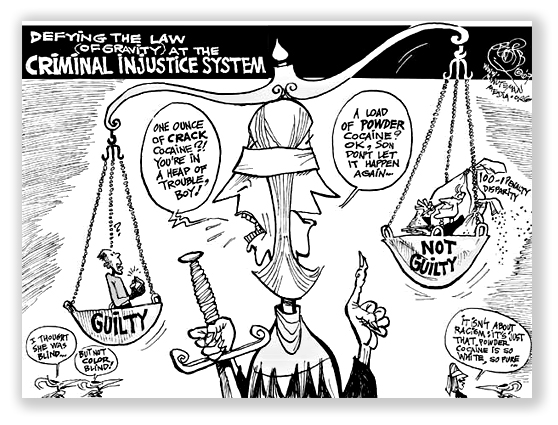We post news and comment on federal criminal justice issues, focused primarily on trial and post-conviction matters, legislative initiatives, and sentencing issues.
SMARTER SENTENCING ACT REDUX
 We were a bit befuddled when Sen. Mike Lee (R-Utah) announced by press release on October 5, 2017, that he and Sen. Richard Durbin (D-Illinois) had “reintroduced the Smarter Sentencing Act of 2017.” It was not clear whether this was a complete retread of the Smarter Sentencing Act of 2015, S. 502, that died without a vote last December, or whether it was new and improved (or just different).
We were a bit befuddled when Sen. Mike Lee (R-Utah) announced by press release on October 5, 2017, that he and Sen. Richard Durbin (D-Illinois) had “reintroduced the Smarter Sentencing Act of 2017.” It was not clear whether this was a complete retread of the Smarter Sentencing Act of 2015, S. 502, that died without a vote last December, or whether it was new and improved (or just different).
The confusion was compounded because we were unable to locate a draft of the Smarter Sentencing Act of 2017 anywhere over the next 10 days. We called Sen. Lee’s office last week for a copy of the measure, and received our copy yesterday.
Yes, indeedy, the 2017 version of the bill is identical to old S.502, except for a boatload more sponsors (21 from both sides of the aisle). Highlights of the measure include
• expanding the “safety valve” contained in 18 USC 3553(f) – which permits court to relieve low-level drug offenders with relatively clean records to avoid mandatory minimum sentences under some circumstances – to include people with slightly more criminal history.
Currently, a single misdemeanor in one’s background can disqualify the defendant from “safety valve” consideration. Under the proposed change, a couple of felonies will be too much, but more young defendants facing their first serious criminal charge would be sentenced under a scheme that let the judge weigh individual factors rather than applying an inflexible and harsh minimum sentence.
• making the Fair Sentencing Act of 2010, which reduced disparity between crack cocaine and powder cocaine from 100:1 to 18:1, retroactive.
 In the wake of basketball star Len Bias’ death in 1988, Congress passed the draconian Anti Drug Abuse Act, which equated one gram of crack cocaine to 100 grams of cocaine powder. As a result, drug sentences – which are driven by the amount of drug involved in the crime – soared. The defendants in crack cases were overwhelmingly black.
In the wake of basketball star Len Bias’ death in 1988, Congress passed the draconian Anti Drug Abuse Act, which equated one gram of crack cocaine to 100 grams of cocaine powder. As a result, drug sentences – which are driven by the amount of drug involved in the crime – soared. The defendants in crack cases were overwhelmingly black.
After years of urging by the Sentencing Commission and studies showing that Congress’ rationale for the ADA – that crack was more addictive and crack offenses more violent – was bunkum, Congress passed the Fair Sentencing Act in 2010. Unfortunately, to convince recalcitrant senators to support it, the retroactivity portions of the law were stripped out. Thus, a crack defendant sentenced August 3, 2009, was hammered with the 100:1 ratio, while a defendant sentenced August 3, 2010, was treated more in line with what a cocaine powder defendant would face.
The SSA would make the FSA retroactive, permitting defendants sentenced harshly prior to the adoption of the law eligible for resentencing, at their judges’ discretion, to a more reasonable term.
• cutting mandatory minimums in the drug trafficking laws.
Currently, the Byzantine sentencing regime in 21 USC 841(b) provides differing levels of mandatory minimum sentences for various quantities of different drugs, various number of prior drug felonies, and whether death or serious injury resulted from the drug dealing.
 Under the SSA, a 10-year mandatory minimum sentence would become 5 years, 20 years would become 10 years, five years would become two years. Right now, a defendant with two prior drug felonies (no matter how old) caught with five kilos of cocaine gets a mandatory life term: no ifs, ands or buts. Sure, the public’s thirst for vengeance is slaked by such toughness. But somehow, when the public sees the same defendant, bent and gray, shuffling across the prison yard a quarter century later, the tough sentence seems pretty wasteful.
Under the SSA, a 10-year mandatory minimum sentence would become 5 years, 20 years would become 10 years, five years would become two years. Right now, a defendant with two prior drug felonies (no matter how old) caught with five kilos of cocaine gets a mandatory life term: no ifs, ands or buts. Sure, the public’s thirst for vengeance is slaked by such toughness. But somehow, when the public sees the same defendant, bent and gray, shuffling across the prison yard a quarter century later, the tough sentence seems pretty wasteful.
The SSA would turn the mandatory life sentence into a mandatory minimum of 25 years.
• cutting mandatory minimums in 21 USC 960 for drug mules carrying drugs into the country courier in half.
 Your poor, dumb peasant from El Cocador humping marijuana across the border or clueless young woman flying in to JFK from East Slobovia with heroin in the liner of her suitcase… These are the couriers, the lowest of the low-level defendant being paid maybe two shekels for hauling someone else’s big score. Under 21 USC 960, the drug importation criminal statute, they get hammered with the same mandatory sentences as Mr. Big, the kingpin staying safely offshore.
Your poor, dumb peasant from El Cocador humping marijuana across the border or clueless young woman flying in to JFK from East Slobovia with heroin in the liner of her suitcase… These are the couriers, the lowest of the low-level defendant being paid maybe two shekels for hauling someone else’s big score. Under 21 USC 960, the drug importation criminal statute, they get hammered with the same mandatory sentences as Mr. Big, the kingpin staying safely offshore.
The SSA would cut the mandatory minimums applicable to couriers by half.
The bill does not explicitly make any change it proposes retroactive other than the extension of the FSA, but a fair reading of Section 5 of the SSA suggests that the Sentencing Commission should do so according to its retroactivity procedures.
Some of the Smarter Sentencing Act provisions echo those of the Sentence Reform and Corrections Act of 2017, introduced two days earlier. We anticipate that the provisions of the two bills will be blended into a single package by the Senate Judiciary Committee.
S.1933, Smarter Sentencing Act of 2017 (introduced Oct. 5, 2017)
– Thomas L. Root

